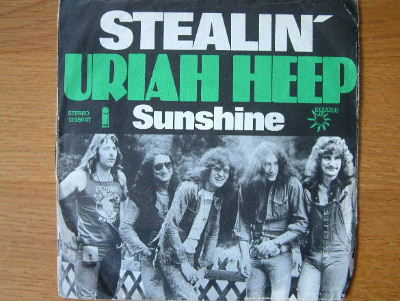


Music People, Various Artists (Taj Mahal), 1972.Happy Just to Be Like I Am, Taj Mahal, 1971.Jim Kweskin's America, Jim Kweskin, 1971.Schlagers!, Various Artists (Arlo Guthrie), 1970.Ragtime Jug Stompers, Dave Van Ronk, 1969.Running Down the Road, Arlo Guthrie, 1969 (his version appears in the film " Two-Lane Blacktop").Johnny Young and His Chicago Blues Band, Johnny 'Man' Young, 1966.San Francisco Bay Blues, Jesse Fuller, 1963.The Country Blues, Various Artists (Memphis Jug Band), 1959."Stealin'" appeared performed by them on the album Shady Grove in 1996 and on the compilation album Acoustic Disc 100% Handmade Music, Volume 3 in 1997. Jerry Garcia also recorded the song with friend and collaborator David Grisman. Other Dead albums the song has appeared on including: Years later, the sessions would appear of the bands twelve- CD box set The Golden Road (1965-1973) released on Octobefore released as part of the stand-alone album Birth of the Dead in March 2003. The song was part of the first ever release by the San Francisco, CA based psychedelic rock band the Grateful Dead, along with "Don't Ease Me In." The Scorpio Sessions, as the recording session was known, comprised several tracks which were released in limited supply by Scorpio Records in July 1966. In any case, this recording provided the basis for modern remakes after it was re-released in 1959. On the other hand, most of the lyrics clearly predated the Memphis Jug Band recording. By some standards, this is correct, as a compilation of earlier lyrics is often equated with authorship in the blues genre. The label on this release named Will Shade as the composer, and the copyright is still administered by Shade’s publisher, Peermusic (formerly known as the Southern Music Publishing Company). The song as we know it today was first recorded by the Memphis Jug Band as "Stealin' Stealin'." This recording session took place on Septemin Memphis, TN and featured Will Shade ( harmonica), Vol Stevens ( acoustic guitar), Ben Ramey ( kazoo), and Jab Jones ( vocals, jug). It does appear in the folk song “ I Know You Rider” and may actually predate Cannon.Īnother lyric associated with Gus Cannon is “She's a married woman, but she comes to see me all the time,” which appeared in his “Minglewood Blues,” recorded January 30, 1928. However, this line doesn’t appear in any of his recorded songs. Gus Cannon claimed to have written the opening line, "Put your arms around me like a circle 'round the sun." On this basis, Cannon is sometimes credited with authorship of the song. While it isn't the group's finest record, it remains a solid listen for Uriah Heep fans.The lines “If you don’t believe I love you, look what a fool I’ve been / If you don’t believe I’d fall for you, look what a hole I’m in” were recorded by the New Orleans jazz musician Clarence Williams in 1921 and again by Leona Williams in 1922 as “If You Don't Believe I Love You, Look What a Fool I've Been.” However, Sweet Freedom is likable enough to triumph over these missteps. Despite these successful experiments, there are a few tracks that weigh the proceedings down: "Seven Stars" takes an exciting riff and runs it into the ground with a repetitive arrangement and "Pilgrim" is an over-the-top stab at an adventure tale that pushes the group's excesses to the level of self-parody.
STEALIN URIAH HEEP LYRICS FREE
Another highlight in this vein is the title track, a song that combines lyrics about the price of being free with an organ-fuelled, hymn-like melody. These sentiments were combined with a stirring, soulful melody that helped make the song a radio favorite. Instead of the mystical tales that dominated albums like Demons and Wizards, Sweet Freedom offers lyrics designed to appeal to the listener on a personal level: The most stirring example is "Stealin'," a song about the regrets that come with living a self-obsessed life. The group also explores new avenues in the lyrical arena. The gentle, acoustic guitar-dominated "Circus" is another change of pace that pushes the group's sound in a meditative, folky direction. The band's desire to break new ground is established with the lead-off track, "Dreamer": while it riffs as hard as the band's past rockers, it adds a surprising element of funkiness into the band's sound. They moved on to a new label (Warner Bros.) and began to explore new styles to flesh out their combination of prog complexity and heavy metal muscle. By 1973, Uriah Heep had progressed from an English heavy metal band to a worldwide success.


 0 kommentar(er)
0 kommentar(er)
